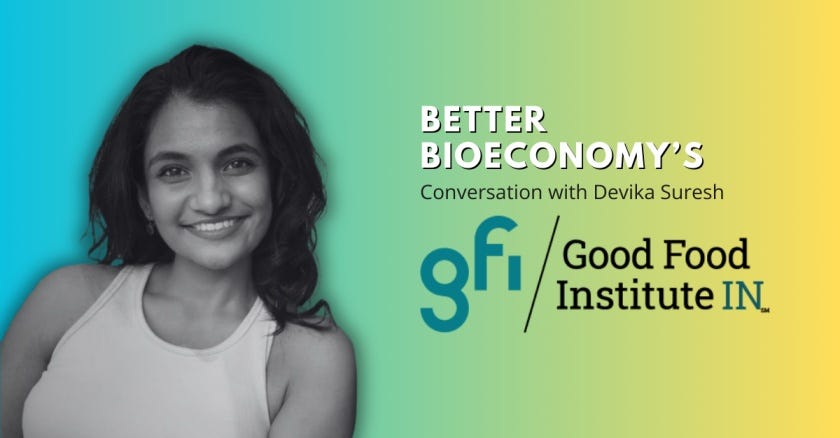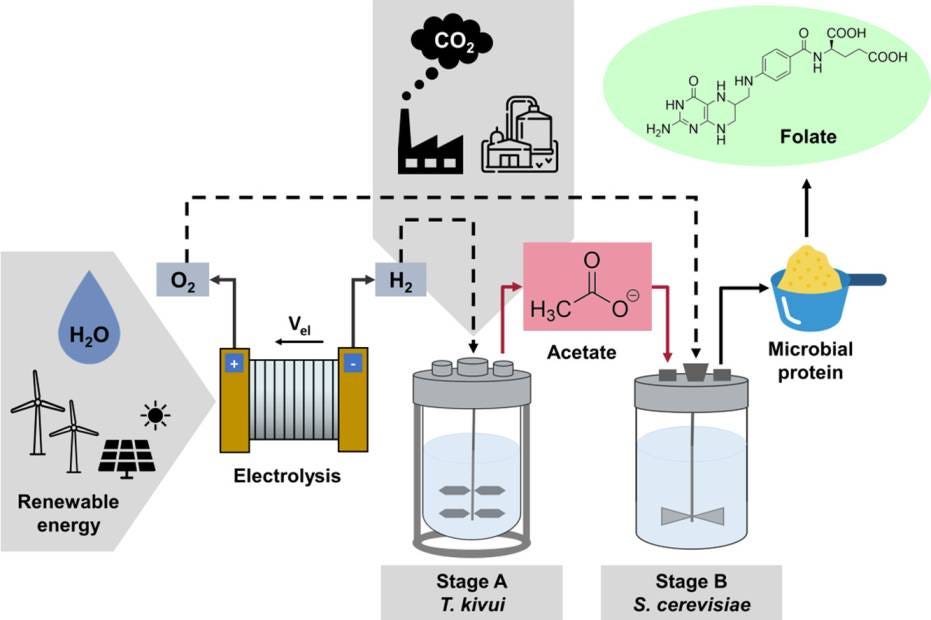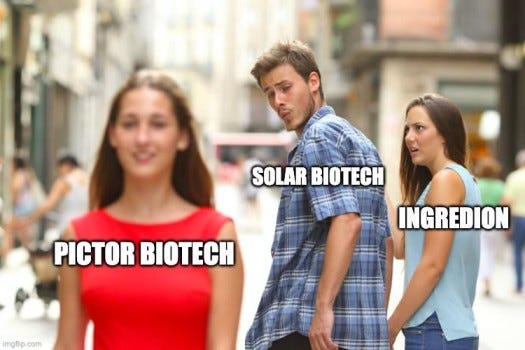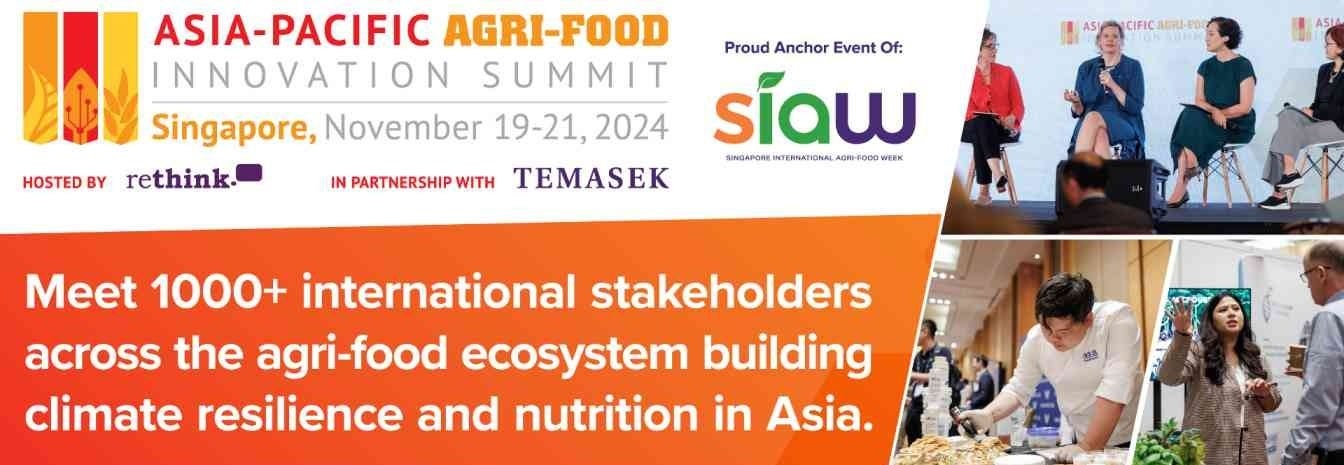Formo’s $61M Series B, $20M+ for Biopesticides, and Making Proteins and Vitamins From Air
Also: How GFI India is helping make India a global leader in smart protein
Hey, welcome to issue #74 of the Better Bioeconomy newsletter. Thanks for being here!
Here’s my favourite quote that I came across while working on this week’s issue:
“We are approaching 10 billion people in the world, and with climate change and limited land resources, producing enough food will become harder and harder. One alternative is growing proteins in bioreactors through biotechnology rather than growing crops to feed animals. It makes agriculture much more efficient.”
BTW, if you are an APAC-based agrifood startup founder working on solutions for sustainable food systems, I'd love to connect—feel free to reach out! 🙂
Alright, let’s dig into the latest developments in biotech, shaping the future of food and agriculture! 🍽
EXCLUSIVE
🇮🇳 My conversation with GFI India’s Devika Suresh: Laying the foundation for smart protein leadership in India
Devika Suresh, Innovation Specialist at The Good Food Institute India, shared how the organisation is helping India become a global leader in the smart protein (alt protein) sector—from startup support to talent development and policy advocacy.
Here’s a sneak peek into what we discussed:
India is well-positioned to lead global plant-based ingredient supply as a top producer of pulses and indigenous crops.
GFI India uses "smart protein" instead of “alt protein” to position the industry as a value-added solution which resonates better with policymakers.
Through initiatives like ISPIC and smart protein university chapters, GFI India is helping nurture innovators, entrepreneurs, and researchers.
India’s talented workforce in agri-processing and biotech, along with its affordable infrastructure, makes it a great hub for smart protein innovation.
A big challenge is that smart protein products often come with a premium price tag—sometimes 2-3x more than animal-based counterparts.
Many smart protein products are modelled after Western food formats (like burgers), which don't always resonate with traditional Indian diets.
BIO BUZZ
🇩🇪 Researchers developed protein and vitamin B9 from microbes using H2, O2, and CO2, powered by renewable energy
The German researchers designed a two-stage bioreactor that uses a bacterium (Thermoanaerobacter kivui) to convert H2 and CO2 into acetate, which baker's yeast (Saccharomyces cerevisiae) then fed on to produce protein and vitamin B9.
Just 6 grams of dried yeast meets the daily requirement for vitamin B9, and 85 grams of yeast covers 61% of daily protein needs, outperforming traditional protein sources like meat and lentils.
This breakthrough could help solve big global issues like food security and climate change. By reducing the need for farmland and running on renewable energy, it leads to more efficient and sustainable food production.
Source: ScienceDaily
🇸🇪 Melt&Marble scaled its precision-fermented fat production to over 10,000 litres, a major step toward commercial production
This opens doors for testing their custom fats in a bunch of applications, like alt proteins, confectionery, bakery, and personal care, setting the stage for broader market integration.
The Swedish company engineers yeast metabolism to create fats with specifically controlled properties, making sure they meet precise product needs in different applications.
They plan to further refine their designer fats for foods like alt meats, cheeses, and baked goods, aiming to bring these products to market in the coming years.
Source: Cell Base
🇰🇷 TissenBioFarm won the “Cultured Meat Product of the Year” at the AgTech Breakthrough Awards for its cost-efficient cultivated meat production
TissenBioFarm’s novel biofabrication system produces whole-cut marbled steaks. It can churn out 300 kg of muscle and fat fibres per hour, up to 35,000x faster than conventional 3D bioprinting.
Using optogenetics technology, the South Korean startup stimulates cell proliferation and differentiation with light, avoiding expensive proteins and slashing production costs.
TissenBioFarm uses biomimicry to replicate the marbling in beef, which enhances texture and flavour. They can also tweak the fat and nutritional profile to suit different consumer needs.
Source: vegconomist
🛠 Pictor Biotech acquired the assets of biomanufacturing startup Solar Biotech in an auction process
Pictor Biotech outbid Ingredion in a competitive auction offering $20M versus Ingredion’s $15.2M bid. The acquisition will allow Pictor Biotech to assume Solar Biotech’s contracts and assets.
Pictor Biotech is led by former Novozymes executive Peter Rosholm. He plans to retain all US-based employees from Solar Biotech and invest a "substantial" amount of capital to scale up the company’s biomanufacturing capacity.
Solar Biotech, focused on microbial and biomanufacturing technologies that could sustainably produce bio-based products like food. Despite raising over $15M, they faced cash flow problems after expanding too fast, leading to a bankruptcy filing in mid-2023.
PS: This is a developing story.
Source: AgFunder
🌾 Scientists propose virus-based therapies to boost crop resilience as an efficient alternative to agrochemicals and breeding techniques
An international research team led by the Spanish National Research Council advocates for using viral vectors to introduce beneficial genes in crops. This could mean faster harvests, improved drought tolerance, and healthier plant structures, among other innovations.
Despite the proven success of virus-based solutions in human and animal medicine, crops are still left out mainly due to complex regulations—highlighting a strange gap in agricultural innovation.
The researchers are pioneering plant viral vector technology, looking to fast-track applications for non-food crops and exploring scalable methods for industrial production.
Source: SynBioBeta
MACRO STUFF
🇪🇺 Plant-based and precision-fermented milk set for dominance in Europe by 2040
A new report from Bright Green Partners suggests that plant-based milk could be 10% cheaper than cow’s milk by 2040—if it can meet consumer expectations for taste and nutrition, especially when it comes to protein and essential nutrients.
Precision-fermented dairy products, such as animal-free whey and casein proteins, are also expected to become competitive as technology improves and production scales up.
The cost of producing traditional cow’s milk could rise by 30%, thanks to stricter environmental regulations and efforts to reduce carbon emissions. When factoring in the environmental costs, the price of cow’s milk could almost double, making plant-based options even more appealing.
Source: vegconomist
🇨🇳 Policy proposals that can solve bottlenecks and pave the way for the widespread alt protein commercialisation in China
The alt protein sector in China needs a network that brings together the government, research experts, investors, and regulators, so they can pool resources and work together toward a common goal.
Stronger collaboration between the food industry and academic researchers is key to unlocking the potential of China’s native protein sources and encouraging more investors to support the alt protein space.
The country should move faster on approving novel foods (like cultivated meat) and learn from other countries. At the same time, it should improve talent development and protect innovation through stronger intellectual property laws.
Source: Green Queen
BIO BUCKS
🇩🇪 Formo raised a $61M Series B and launched fermentation-based, animal-free cheeses in 2,000+ stores in Germany and Austria
They've launched Frischhain, a cream cheese made from koji protein, available in plain and herb varieties, with a tomato version and a Camembert-inspired cheese on the way.
Formo's cheeses are made using the microbe Aspergillus oryzae, a koji mould, which has been used in traditional Japanese foods like miso and sake. Its protein structure resembles whey, which makes it a great base for dairy alternatives.
With a total of $117M raised, Formo is gearing up to scale production, go international, and develop more cheese alternatives. Formo is also pushing to launch cheeses made with precision fermentation-derived casein in early 2025.
Key investors: FoodLabs, EQT Ventures, Lowercarbon Capital, and more
Source: Green Queen
🇩🇰 MATR Foods secured a €20M loan from the European Investment Bank with support from the EU’s InvestEU initiative
The money will go toward building their first large-scale production facility and boosting R&D. Once complete, the facility will crank out more than 3,000 tonnes of fungi-based meat alternatives each year.
MATR’s products are made using a fermentation process that uses local crops like beetroot. This process creates clean-label products with minimal processing, no additives, and a rich umami flavour while being lower in fat than many existing meat alternatives.
The Danish firm’s products emit 94% less CO2 than beef. Their new facility could potentially cut more than 100,000 tonnes of CO2 in Europe’s carbon emissions each year.
Source: vegconomist
🏴 SOLASTA Bio raised $14M in an oversubscribed Series A to commercialize peptide-based biopesticides
The Scotland-based ag biotech startup will use the funding to fast-track the launch of their peptide-based bioinsecticides by 2027, which is way quicker than the usual timelines for synthetic pest control products.
Pesticides as we know them are becoming less effective, and on top of that, overuse is causing serious damage to the environment and our health. SOLASTA’s 2023 field trials show their products work just as well, if not better, than conventional insecticides.
Unlike bulky proteins, peptides, which are smaller proteins, don’t need expensive cold storage and are more stable in the field. They’re able to target pests with higher accuracy while leaving beneficial insects like pollinators unharmed, making them safer for biodiversity and human health.
Key investors: Forbion (Bioeconomy fund), FMC Ventures, Corteva (Corteva Catalyst platform), and more
Source: AgFunder
🇨🇦 Catalera BioSolutions secured the first close of its $8M Series A to accelerate biopesticide development and commercialization
The company was spun out of Terramera, a Canadian biologicals firm, early this year. Traditionally, it takes years to get biological crop protection products to market, but Catalera is aiming to fast-track this process without inflating costs using its patented technology.
CEO Matthew Dahabieh pointed out that biological products come with their own set of hurdles: they tend to be pricier to produce, have multiple complex actions, and lack the stability of synthetic chemicals. But Catalera’s technology is designed to make these natural ingredients more viable for commercial use.
Series A funding will accelerate the company’s growth, expanding its current product offerings in the US and Mexico, while also enabling new developments in bioinsecticides and botanical biocontrols.
Key investors: S2G Ventures, Farm Credit Canada (FCC) Capital
Source: AgFunder
🇮🇱 MNDL Bio raised $2M for its AI-powered gene optimization platform to target various applications including food
The Israeli startup’s platform can increase protein production by up to 200x, cut development timelines by 33%, and reduce costs by 90% compared to the old trial-and-error methods.
The company's AI and deep learning technology replace inefficient methods, helping companies across biotech, pharmaceuticals, and food industries streamline their R&D processes, reducing costs and increasing success rates.
The funding will power MNDL Bio’s R&D efforts to refine its AI capabilities and secure additional patents. They’re also ramping up commercial efforts through strategic partnerships and sales force expansion.
Key investors: Earth & Beyond Ventures, IIA (Israel Innovation Authority), and CPT Capital
Source: CTech
PODS & POSTS
🎣 About 50% of fish caught are used to feed farmed animals, can "good" fungi help save our seafood and the ocean?
Instead of using fish to feed other animals, we could switch to using fungal proteins and bacteria-based feeds. These sustainable alternatives reduce our dependence on fishmeal and help prevent overfishing while giving fish farms a nutrient-packed option.
Fungi do more than just feed fish—they help clean up the environment too. They can purify water and soil in fish farms by breaking down harmful chemicals like PFAS, creating cleaner, healthier habitats for the fish, and ultimately for us.
Fungi-based solutions can also extend seafood shelf life through antifungal coatings and improve flavours through fermentation. With fungi in the mix, seafood can be both tastier and more sustainable.
Source: Maya Benami, PhD
🌴 Shara Ticku, co-founder of C16 Biosciences, on using microbial fermentation to produce a palm oil substitute to tackle climate change
APAC AGRI-FOOD INNOVATION SUMMIT
🤝 Meet 1000+ global leaders who are accelerating climate-adaptation strategies for food security in Asia
Better Bioeconomy is excited to be a media partner for the Asia-Pacific Agri-Food Innovation Summit, taking place at Marina Bay Sands on November 19-21!
As the anchor event of Singapore International Agri-Food Week (SIAW), in collaboration with Temasek, the Singapore Food Agency (SFA), and Enterprise Singapore (ESG), the Asia-Pacific Agri-Food Innovation Summit will bring together over 1000 global leaders to identify the strategic priorities as we build greater capacity, security, and resilience in Asia’s agri-food system.
👀 Use my discount code ‘BIO10’ to save 10% – the offer ends on October 3rd!
See you there! 👋🏾
BETTER BIOECONOMY EXCLUSIVE
💬 My conversations with bioeconomy innovators
Biotech consultant and ex-CSO of Vow, James Ryall: Bridging Science and Business to Support Startups Using Biomanufacturing
Synonym's co-founder, Joshua Lachter: Financing and Developing Infrastructure for the Bioeconomy
Bioshyft's founder, Gerrit Feuerriegel: Connecting Innovators, Investors, and Incumbents to Drive the Bioeconomy
Terra Bioindustries’s CMO, Rebecca Palmer: Turning Agrifood Byproducts Into Nutrient-Rich B2B Ingredients
That’s a wrap. Thank you for taking the time to read this issue!
Again, if you are an agrifood startup founder working on solutions for sustainable food systems, I’m happy to chat! 👋🏾
Are you new here?
Know anyone else who would dig this newsletter?








Wow, tremendous issue! Thanks for publishing this week's outstanding newsletter. I loved the humor especially the Vince McMahon meme! Ha ha 😂 🤣. Thank you so very much for helping educate us. The community appreciates you tremendously 👍👏